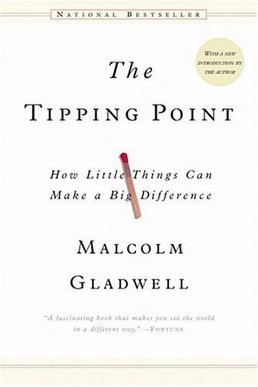A lot of the book is about epidemics. What makes some things spread and why. There are certain factors that make it possible. When the stars are right, the epic can reach a tipping point and spread like a wild fire.
The Law of the Few
First interesting idea is identifying special type of persons. Salesmen, Mavens and Connectors are not like the rest of us and their role in making something to tip is crucial.
Connectors are people who are extraordinarily well connected. They know a lot of people and are eager to meet more. Many times they are people who have a leg in many different circles. And they genuinely like other people.
Mavens hoard information. They are eager to spread it and keen to learn even more. They are the people you naturally go to when you need to know something.
Salesmen are charismatic people who can persuade. They have an innate gift that makes people want to agree with them.
The Stickiness Factor
In addition to the message carrier, the message itself makes a difference. Rumors are sticky and spread easily, but boring stuff escapes ones mind rather fast. Many times the message can be modified to become more sticky.
Including a map of campus increased the change for students to get vaccined. Sesame street was at least originally created in a way that children find it easy to follow. For children it's critical that they can understand the plot in order to keep them interested. If characters are having adult conversations or using language they don't understand, they easily lose focus.
Teens don't smoke because smoking is cool, but because smokers are cool. Many times smokers are seen as rebels, sexy and interesting. So actually some smokers are like Salesmen for smoking. Interestingly whether someone becomes a nicotine addict has a strong correlation with how the first experience was. If it was pleasant, there's a big change the person can get hooked. (Okay, this might be obvious, but still interesting.) Also there seems to be a tipping point to smoking. If you smoke less than certain amount of cigarettes a day, you can go on for years without getting heavily addicted.
Power of Context
Whether we are discussing a contagious disease or an idea, context plays a critical role. Theory of broken windows states that enviroment affects people's (criminal) behavior. If you let one window break, it is kind of an invitation to break more. Same seems to apply to graffiti and small criminal acts. If you can weed out the small criminalities, according to this theory (and as is seen in practice) it will decrease the number of more serious crimes. In software development one could replace windows with a build. If you don't keep your build green, you are asking for trouble.
Dunbar's number, ˜150, seems to have a special meaning for us humans. According to different studies it is the maximum number of people we can feel connected with. With that many people you can have personal relationship in a company. After that limit is exceeded, things tend to get more complex. (Fun fact: it's a also the limit for SAFe Agile Release Train size.)
As a final remark, the role of the family is not as influential as we generally thing. Who you hang out with makes a bigger difference. So it's much better to grow in a lousy family in a good neighborhood than in a rich and loving family in a bad neighborhood.
Getting some idea to a stage of epidemics can be engineered. You need to take into account all the three factors and it probably isn't easy, but I'm positive that it can be done. Successful advertising companies have done this multiple times. Again, slightly disturbing, but good to keep in mind.

No comments:
Post a Comment